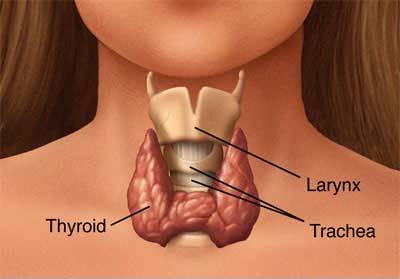The thyroid is a small gland, shaped like a butterfly, located in the lower part of your neck.

The function of a gland is to secrete hormones. The main hormones released by the thyroid are triiodothyronine, abbreviated as T3, and thyroxine, abbreviated as T4. The problems with the thyroid can be:
1. Hypothyroidism:
This is an underactive thyroid so produced not sufficient amounts of T3 and T4. Symptoms of hypothyroidism usually go along with a slowdown in metabolism, and can include fatigue, weight gain, and depression, among others. The most common cause of hypothyroidism is an autoimmune disease called Hashimoto disease.
2. Hyperthyroidism:
This is a thyroid which become overactive in producing the thyroid hormones. The symptoms are goiter, fatigue, weight changes, heart beat and blood pressure problems. Also here the most common cause is an autoimmune disease called Graves diseases.
3. Thyroid Cancer
4. Thyroiditis:
Thyroiditis is an inflammation of the thyroid.
Synthesis and release of the thyroid hormones:
Thyroid hormone synthesis and release is controlled by the hypothalamic-pituitary axis involving negative feedback control. Thyrotrophin-releasing hormone (TRH) is released from neurosecretory cells in the hypothalamus and travels via portal capillaries to the anterior pituitary where it stimulates the release of TSH into the general circulation. It is bound by TSH receptors in the thyroid gland which stimulate synthesis of the iodine pump in the follicular cells and the production of thyroglobulin and thyroperoxidase, with the effect of an in an increase in the release of the thyroid hormones. Circulating levels of thyroid hormones exert negative feedback control on the TSH secretion. Conversely, when thyroid hormone levels are low there is stimulation in the secretion of TSH.
Thyroid function tests
These comprise the thyroid hormones (T4 and T3, total or free), thyroid stimulating hormone (TSH) and thyroid autoantibodies: anti-Thyroid peroxidase (TPO) and anti-thyroglobulin (TG). Thyroid function tests can demonstrate the presence or the absence (euthyroid) of thyroid dysfunction but further investigations and clinical assessment are necessary to determine the cause and select appropriate treatment. This is a cancer of the thyroid nodules or tissue.
Interpretation of Thyroid function tests
Hyperthyroidism
TSH will be suppressed to below the reference range and total or free T4 will be elevated. If the TSH is suppressed and the total or free T4 is normal, a total or free T3 should be measured. If this is elevated it is indicative of T3 thyrotoxicosis. If the total or freeT3 is normal, the TSH could be suppressed due to non-thyroidal illness.
Hypothyroidism
TSH will be significantly elevated and total or free T4 below the reference range. Thyroxine replacement is indicated by such results. It is frequently found that there is a moderate elevation of TSH with total or freeT4 in the normal range; the pattern of sub-clinical or compensated hypothyroidism. A positive TPO antibody result indicates that autoimmune disease is present.
Thyroid Markers